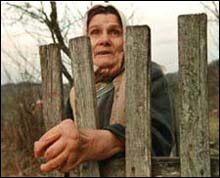


Stage 3 - Interviews Refugees
Related IssuePost-Traumatic Stress Disorder
Journalists who cover wars often must deal with several aspects of the syndrome of post-traumatic stress disorder (PTSD), a set of psychological reactions to experiencing disturbing events. First, journalists often interview subjects who have witnessed horrific violence, who have lost family members, or who may have been injured or subject to torture themselves.

Esma Halilovic, 65, a refugee from the fallen Muslim enclave of Srebrenica, stands outside of the house she has occupied for the past five days in the previously all-Serb village of Vuzoca, Monday Nov. 27, 1995. Many of the refugees who fled Srebrenica this past summer are being placed in villages where Serbs used to live as ethnic expulsion continues on both the Bosnian government and Serb sides. Four months ago she and about 100 other refugees from her hometown had husbands, sons and homes in besiegedeastern Bosnia. Today, their men are missing or dead, and they're alone in a strange village. AP: Photo/David Brauchli
Second, journalists - like relief workers, medical staff, and other front-line personnel - often experience forms of PTSD themselves, as a result of reporting, absorbing and conveying shocking information.
The American Psychiatric Association characterizes PTSD as at least three months of recurrent and intrusive recollections of the event, emotional numbing, and avoidance of people and places that are reminders of the event. Another common symptom is hyperarousal, which may include irritability, jittery behavior, poor concentration, sleep disturbances, and feeling a lack of security. Trauma survivors often become depressed and have trouble with work and family relationships. People with the disorder may not understand what is causing their symptoms and may never be diagnosed, suffering in silence, perhaps for years. Counseling and cognitive behavioral therapy have proven helpful to many patients with PTSD.
Interviewing traumatized subjects
Although the atmosphere in a war zone is often stressful in itself, reporters who work in conflict areas should try to approach interview subjects who may have suffered a traumatic experience with extra sensitivity and respect, says Roger Simpson.
Simpson is the director of the Dart Center for Journalism and Trauma and a professor of communications at the University of Washington in Seattle. The Dart Center, which opened in February 2000, aims to educate students, reporters and editors about trauma issues related to journalism. Simpson is co-author of Covering Violence: A Guide to Ethical Reporting About Victims and Trauma.

Roger Simpson. Photo: Courtesy of the Dart Center
Journalists who have experienced PTSD
Frank Smyth is a freelance journalist who has covered conflicts in Africa and Latin America. Smyth's work has been published in The Christian Science Monitor, The Washington Post, and The New York Times. Smyth was covering Kurdish rebels in Iraq in 1991 when they were overtaken by Iraqi troops. The photographer and translator he was traveling with were shot point-blank. Smyth, who was captured shortly afterwards, was accused by the Iraqi military of being a CIA spy and was held for 18 days. After his ordeal, Smyth developed PTSD, and remains keenly aware of the risks involved with war reporting and interviewing trauma victims. He believes that reporters should approach victims with empathy and consideration. "[Survivors] have a right not to speak and they may need time to collect themselves," he said. "Most people, however, will talk, as survivors often want people to know their story."
Smyth flatly rejects the notion that showing empathy to victims will somehow compromise a reporter's detached objectivity. Rather, he believes it will allow the journalist to better communicate the victim's pain to the reader. "Empathy is the way most journalists compel anyone to open up and talk, and having empathy for survivors of trauma is not only appropriate, it is the only fair way, in my mind, to approach them," he said. "Empathy with their pain, however, should not translate into you assuming their cause, if they have one."
Reporters' psychological reaction to witnessing violence, suffering, and bloodshed has only recently begun to be discussed in the profession. Research has been done on the psychological effects of trauma on war veterans, police officers, survivors of motor vehicle accidents, and rape victims, but until recently, no studies have examined the effects of trauma on war reporters.
Dr. Anthony Feinstein, an associate professor of psychiatry at the University of Toronto, has completed a study of the prevalence of PTSD in war correspondents, commissioned by The Freedom Forum. A group of 140 war reporters participated in the study. Seventy percent of the reporters in the study had worked in Bosnia. Other conflicts covered included Rwanda, Chechnya, Sierra Leone, Indonesia, Ethiopia and Somalia. Feinstein found that war reporters were more likely to have symptoms of PTSD and depression than journalists in the non-war reporter control group. The prevalence rate for PTSD in war journalists was 28 percent. To put the results in perspective, the study notes that the rates of PTSD in traumatized police officers is 7-13 percent, and veterans have a rate of approximately 30 percent, depending on their exposure to combat. War reporters were also more likely to have substance abuse problems than their other colleagues.
Simpson, the director of the Dart Center, attributes the reluctance to talk about PTSD in the journalism profession to what he calls the "culture of journalism": a combination of reporters' desire to be objective and uninvolved emotionally, some machismo, and the fear of editors' reprisal if a reporter admits to having a problem. Simpson reports that after the 1995 bombing of the federal office building in Oklahoma City and the spate of high school shootings in the United States, some reporters began to discuss their difficulties in covering those stories.
"It's really brought a lot of reporters out of the closet, in a way, in terms of being willing to acknowledge that they had emotional reactions to the events," he said. In 2000 a new organization, Newscoverage Unlimited, was formed to assist journalists in dealing with post-traumatic stress disorder. Its website contains useful information for journalists regarding the identification of the syndrome, and seeks to help newsrooms devise humane and practical responses.
Some news organizations have taken the initiative to acknowledge and alleviate the stress associated with trauma. The BBC and The New York Times have counseling programs available to reporters to "debrief" them upon returning from a conflict. In 1995 the Daily Oklahoman brought a team of counselors to their newsroom to help reporters deal with the aftermath. But Simpson warns that if counseling is not made mandatory by a reporter's news organization, than he or she might skip it, even though it's available, for fear of showing weakness. Still, Simpson is hopeful that attitudes about reporters needing help are changing for the better. "I think there's some recognition that it isn't extraordinary to be affected," he said. "It's not necessarily a condition that means a reporter can't do that kind of work. It just means that there may need to be some other kinds of support for him or her."
Reporters like Smyth, who has gone on the record about his suffering from PTSD, have helped to de-stigmatize the topic in the profession. Smyth, who now works as the Washington, D.C., representative for Committee to Protect Journalists, says it is important for reporters to understand the effects of trauma not only on the people they cover, but also on themselves. "Journalists need to give themselves the opportunity to process the impact of other people's suffering on them," he said. "They need to give themselves the chance to cry."
For more information:
Victims and the Media Program: Michigan State University School of Journalism